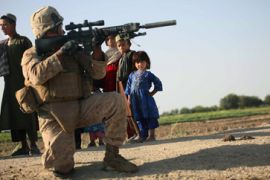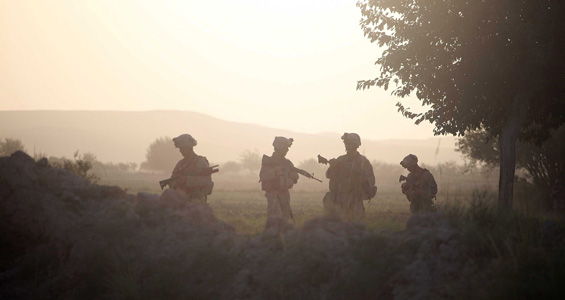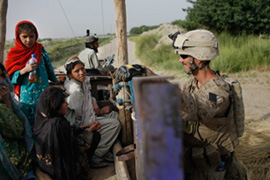Redefining success in Afghanistan
Defence analyst says protecting Afghan civilians should be key to military strategy.

 |
| A leaked report by the top US and Nato commander in Afghanistan warned that without more troops, the eight-year conflict could ‘result in failure’ [GALLO/GETTY] |
General Sir David Richards, the UK’s top soldier, has a phrase which sums up Nato’s Afghanistan campaign perfectly: “The more we have, the more we can do” – and he does not necessarily mean direct combat action.
He also says simply: “Afghanistan is not discretionary”, meaning that the West must be seen to have a successful outcome. Nato does not talk about winning, just success.
Richards also believes that Afghanistan is a very useful signpost to how future conflicts will be fought and that Western governments in particular should sit up and take note of ‘hybrid’ warfare – or ignore the signs at their peril.
Richards should know. For nearly two years he was the top Nato officer in Afghanistan and has an enviable reputation as a ‘seat of the pants soldier’. In other words, he has been there and ‘got the tee-shirt’ as his Toms (soldiers) would say.
He also believes that military operations, from direct combat power to soft re-construction tasks, are non-discretionary for Britain and its allies.
Having said that, he is also keen that if Nato allies are involved, all should pull their weight and only by doing so, with the best equipment and troops trained to the right level, can Nato succeed.
That success is a secure and governable Afghanistan.
Long gone are the Bush administration’s dreams of giving Afghanistan a US-style democracy. Not even the British, possibly America’s closest ally, would want a US-style ‘democracy’!
Protecting Afghans
There is little doubt, then, that Richards is four-square behind US General Stanley McChrystal, the top US and Nato commander in Afghanistan, and his unpublished but widely leaked report to Barack Obama, the US president, on the need for more soldiers in Afghanistan.
 |
| McChrystal’s report calls for a greater focus on protecting Afghan civilians [GALLO/GETTY] |
This goes wider than direct engagement with the fighters, but is neatly linked in to the need for the Nato allies, especially the Americans, to be seen to be protecting ordinary Afghans.
The timing is interesting and problematic.
Hamid Karzai, Afghanistan’s president, has a political crisis to contend with in Kabul and is probably not that concerned with everyday operations in the war-torn south and east.
Kabul has never really administered the whole country – and the elections show this is still true today – but there must be a semblance of central government to bring law and order to the provinces.
Command and control
If the Afghans have command and control issues, then the Nato allies certainly do too.
Fighting a war – and Richards seems to have convinced Gordon Brown, the British prime minister, at least, that Afghanistan is a ‘war’ for the UK – is difficult.
There are over 30 generals in the Nato and US command structures, so command and control is an art-form as well as a place of technological innovation.
But what could more troops do?
The main concern of those fighting the Taliban in the south is the improvised explosive device (IED). These range from several 155mm artillery shells wired together in a simple yet deadly mine, to sophisticated weapons using high technology detonation.
The Taliban and its friends have become steadily more and more effective at making devices which are harder and harder to detect and therefore defeat.
More specialist troops – even a dozen or so – would help.
Getting Nato troops better equipped and trained to deal with IEDs, then transferring those skills to the Afghan national army, is really important. Minimising casualties has to be a prime military objective in Afghanistan.
Staying the course
And then there is the longer term. How long can we expect Obama to keep up this expenditure of resources in Afghanistan and neighbouring Pakistan? His domestic situation is not as immediate as that in the UK, the second largest contributor of troops.
There are over 1.3 million people from Afghanistan, Pakistan, Bangladesh and Muslim parts of India living in the UK and these people expect the British government to either do something to emolliate the suffering of the Afghan people as a whole (and specifically their particular tribal group), or Britain and, arguably, Europe could face even more of a backlash than it already has.
There is a lot riding on success in Afghanistan. Success is now very much about protecting Afghans and helping them move from the 12th century into the 21st as safely as possible.
Afghanistan should join the nations of the world as an equal player and it can, but it needs a little help. Western leaders have to stay the course and help it gain a safe future – to that end more troops will certainly help.
Paul Beaver is an independent defence and security analyst based in London. In his 30 years of commenting on strategic matters he has held senior positions in several organisations, including Jane’s Information Group.
The views expressed in this article are the author’s own and do not necessarily reflect Al Jazeera’s editorial policy.